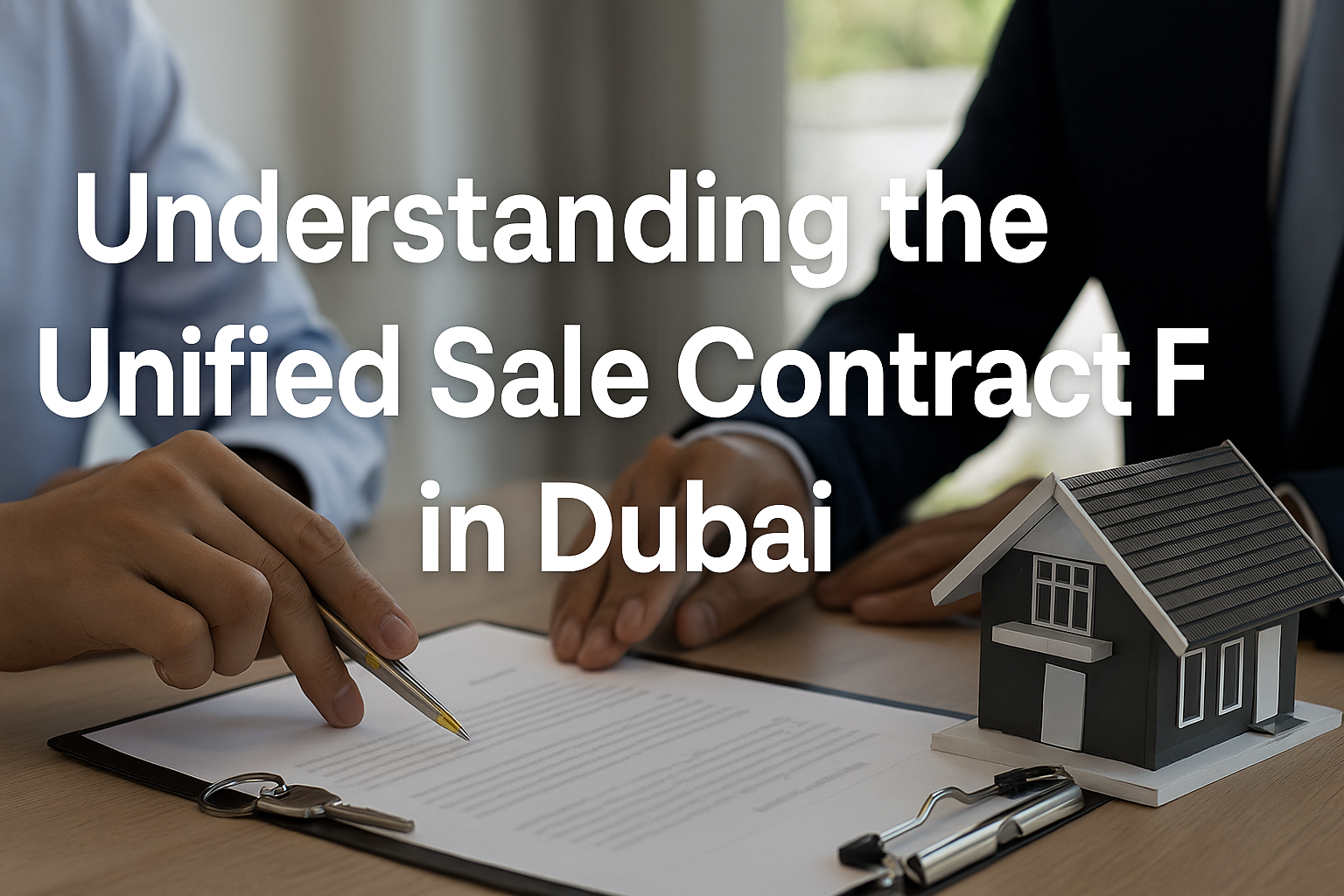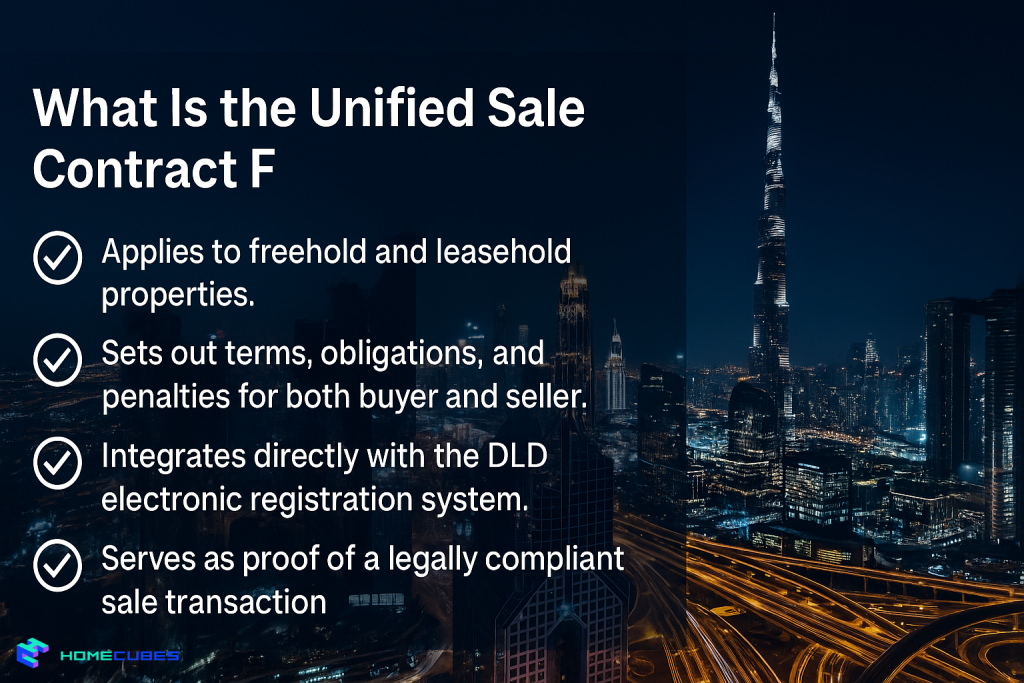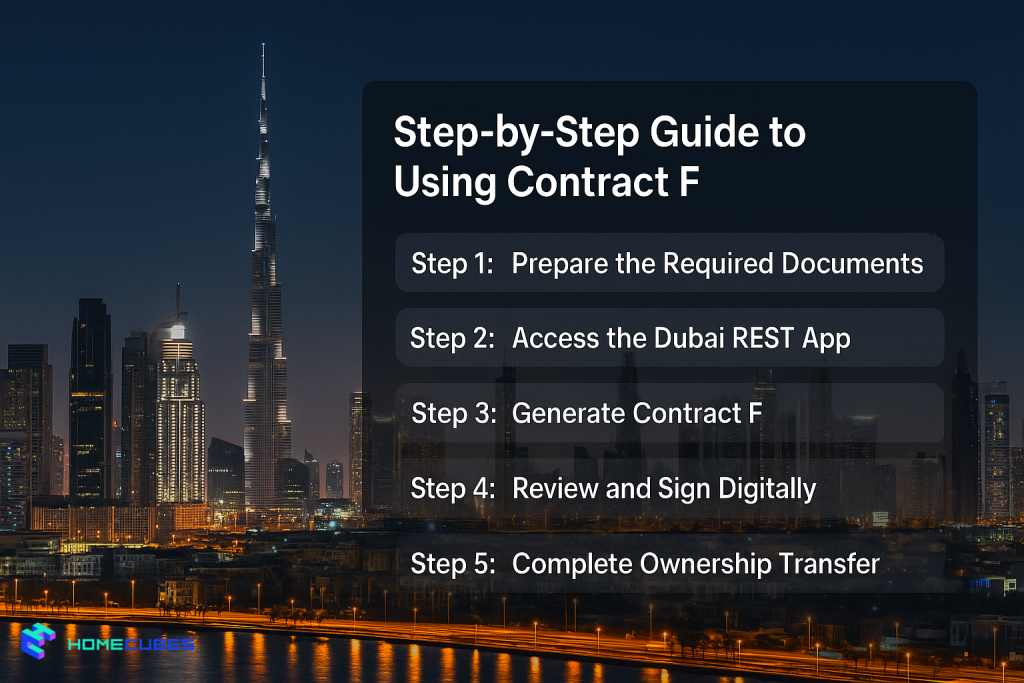

Table of Contents
- Introduction
- Why Standardized Sale Contracts Matter in Dubai
- What Is the Unified Sale Contract F?
- Legal Framework Behind Contract F
- Step-by-Step Guide to Using Contract F
- Key Sections Explained in Detail
- Benefits of the Unified Sale Contract
- Common Mistakes to Avoid
- Case Study: How Contract F Prevented a Dispute
- Unified Sale Contract vs. Other Property Contracts
- Dubai Land Department Fees You Should Know
- Frequently Asked Questions
- Conclusion
Introduction
Dubai’s property market has evolved into one of the most regulated and investor-friendly environments globally. In 2024, the emirate recorded over AED 761 billion in property transactions, underscoring its position as a magnet for both local and international buyers (Dubai Land Department Report).
🇦🇪 Dubai:
– Top 20 globally for ease of doing business
– Bridge between East and West markets
– Free Zone company setup in 3-5 days
– 9% corporate tax, 0% in Free Zones under certain conditions
– 100% foreign ownership allowedBoth offer world-class infrastructure and support. pic.twitter.com/c5XIUbPqL3
— Alessandro Palombo (@thealepalombo) October 29, 2024
With this rapid growth,as well as Dubai real estate five years outlook in 2025, ensuring transparency and legal clarity in property transactions became critical. That’s where the Unified Sale Contract F comes in.
This standardized Sale Contract, issued by the Dubai Land Department (DLD), sets clear, consistent rules for all property sales in the emirate. It protects buyers and sellers alike, reduces disputes, and speeds up ownership transfer — making it an essential document for anyone involved in Dubai real estate as well as real estate investors with limited funds in Dubai or wealthy investors, with full funds looking for luxurious properties.
Why Standardized Sale Contracts Matter in Dubai
Before 2015, property transactions in Dubai often used customized sale contracts drafted by developers, agents, or lawyers. This approach caused several issues:
- Inconsistent clauses led to buyer-seller misunderstandings.
- Hidden terms sometimes put one party at a disadvantage.
- Longer DLD approval times due to lack of uniformity.
- Legal disputes over ambiguous or missing obligations.
The DLD introduced Unified Contract F to address these problems by:
- Creating one template for every property sale.
- Ensuring compliance with Dubai property laws.
- Reducing disputes through clear, standardized terms.
- Enabling digital integration with the DLD’s ownership transfer systems.
This reform improved investor confidence and positioned Dubai among the most transparent property markets worldwide.
What Is the Unified Sale Contract F?
The Unified Sale Contract F is a legally binding document issued by the Dubai Land Department and made mandatory for all property sales in Dubai.

Key highlights:
- Applies to freehold and leasehold properties.
- Sets out terms, obligations, and penalties for both buyer and seller.
- Integrates directly with the DLD electronic registration system.
- Serves as proof of a legally compliant sale transaction.
You can generate, review, and sign the document digitally via the Dubai REST app.
Legal Framework Behind Contract F
Contract F isn’t just a template — it’s backed by Dubai property laws and regulations issued under the DLD and Real Estate Regulatory Authority (RERA).
Relevant legislation includes:
- Law No. (7) of 2006: Regulates property registration in Dubai.
- RERA Circulars: Outline obligations for brokers and developers.
- DLD Procedures: Mandate unified templates for sales, leasing, and brokerage.
By using Contract F, buyers and sellers automatically comply with these regulatory standards, avoiding costly non-compliance penalties.
Step-by-Step Guide to Using Contract F

Step 1: Prepare the Required Documents
Before generating the contract, both parties should collect:
- Emirates ID or passport copies.
- Original title deed.
- No Objection Certificate (NOC) from the developer.
- Proof of payment (if applicable).
Step 2: Access the Dubai REST App
Log in to the official platform using your UAE Pass or Emirates ID.
Step 3: Generate Contract F
Fill in property, buyer, and seller details. Key fields include:
- Property type and number.
- Sale price and payment terms.
- Dates of transfer and possession.
Step 4: Review and Sign Digitally
All parties should carefully review the contract before e-signing.
Step 5: Complete Ownership Transfer
Submit the signed contract to the DLD via REST or an approved trustee office to finalize registration.
Key Sections Explained in Detail
1. Property Details
Specifies the type, location, size, and unit number of the property being sold.
2. Buyer and Seller Information
Records full legal identities, ensuring each party’s rights are recognized.
3. Agreed Sale Price
Outlines the total amount payable and any payment milestones.
4. Payment Schedules
Details deposits, bank transfers, mortgage structures, and due dates.
5. Obligations of Both Parties
- Buyer: Ensures timely payments and completes registration.
- Seller: Clears outstanding liabilities and provides a valid title deed.
6. Penalties for Breach
Defines the financial consequences if either party defaults.
7. Ownership Transfer Procedures
Explains how the DLD finalizes registration after full payment and NOC issuance.
Benefits of the Unified Sale Contract
1. Transparency and Fairness
Equal terms for buyers and sellers — no hidden clauses or ambiguous language.
2. Legal Protection
Contract F aligns with DLD and RERA rules, protecting both parties.
3. Digital Efficiency
Fully integrated with the DLD’s online systems for faster processing.
4. Dispute Reduction
By clarifying obligations upfront, the contract minimizes misunderstandings.
5. Investor Confidence
Standardization assures international investors of a secure transaction environment.
Common Mistakes to Avoid
- Not reviewing the contract carefully → Always check each clause.
- Missing supporting documents → Delays occur without NOCs or IDs.
- Ignoring penalty clauses → Understand financial consequences before signing.
- Relying on verbal promises → Only written terms are legally binding.
Case Study: How Contract F Prevented a Dispute
Scenario:
A buyer agreed to purchase a villa in Arabian Ranches. During negotiations, the seller verbally promised to include certain furnishings. However, the buyer insisted this must be written into Contract F before signing.
Outcome:
When the seller later attempted to withdraw the promise, the written clause in Contract F prevailed, avoiding litigation and protecting the buyer’s interests.
This example highlights why Contract F’s standardized, enforceable structure is critical for smooth property transactions.
Unified Sale Contract vs. Other Property Contracts
| Feature | Unified Sale Contract F | Custom Agreements | Off-Plan Agreements |
| Issued By | Dubai Land Department | Private brokers/lawyers | Developers + DLD |
| Legal Validity | Fully standardized | Varies | Standardized |
| Dispute Risk | Low | High | Low |
| Digital Integration | Yes | Rare | Yes |
| Processing Speed | Fast | Slower | Fast |
Dubai Land Department Fees You Should Know
Although Contract F is free to generate, property sales in Dubai involve mandatory DLD fees:
| Fee Type | Amount | Purpose |
| DLD Registration | 4% of property value | Ownership transfer |
| Trustee Office Fee | AED 4,000 | Registration services |
| Title Deed Issuance | AED 580 | Title documentation |
| Mortgage Registration | 0.25% of loan amount | Applies to financed sales |
Always check the updated rates on the DLD website.
Frequently Asked Questions
- Is the Unified Sale Contract F mandatory?
Yes, it’s required for all property sales in Dubai. - Can I customize Contract F?
Only fields like price and payment schedule are editable; the core format remains fixed. - Does Contract F cover off-plan properties?
No, off-plan projects have separate standardized agreements. - Where can I generate Contract F?
Through the Dubai REST app or any DLD-approved trustee office. - Can foreigners use Contract F?
Yes — it applies equally to local and international buyers. - What happens if one party defaults?
Penalties, including financial compensation, are enforced as per the contract. - How long does DLD registration take?
Typically 2–5 working days, depending on documentation completeness. - Do I need a lawyer to review the Sale Contract?
Not mandatory, but advisable for high-value transactions. - What documents are required?
Passport or Emirates ID, title deed, payment proofs, and NOC from the developer. - Can I sign Contract F digitally?
Yes, e-signatures are accepted via the Dubai REST app.
Conclusion
The Unified Sale Contract F is more than just paperwork — it’s a key part of Dubai’s effort to make real estate transactions clear, transparent, and legally secure. By standardizing property sales, the Dubai Land Department has created a framework that protects buyers, sellers, and investors alike while streamlining the entire process.
Understanding the terms, obligations, and implications of this Sale Contract ensures you make well-informed decisions and avoid costly mistakes. Whether you’re purchasing your first home or expanding your investment portfolio, being familiar with Contract F gives you a significant advantage in Dubai’s dynamic property market.
Make Your Next Property Move Smarter
Navigating Dubai’s property laws and contracts doesn’t have to be complicated. At Homecubes, we specialize in helping buyers and investors simplify every step — from reviewing your Sale Contract to ensuring smooth ownership transfers.
📩 Contact Homecubes today and gain expert support for stress-free, data-driven property decisions.










